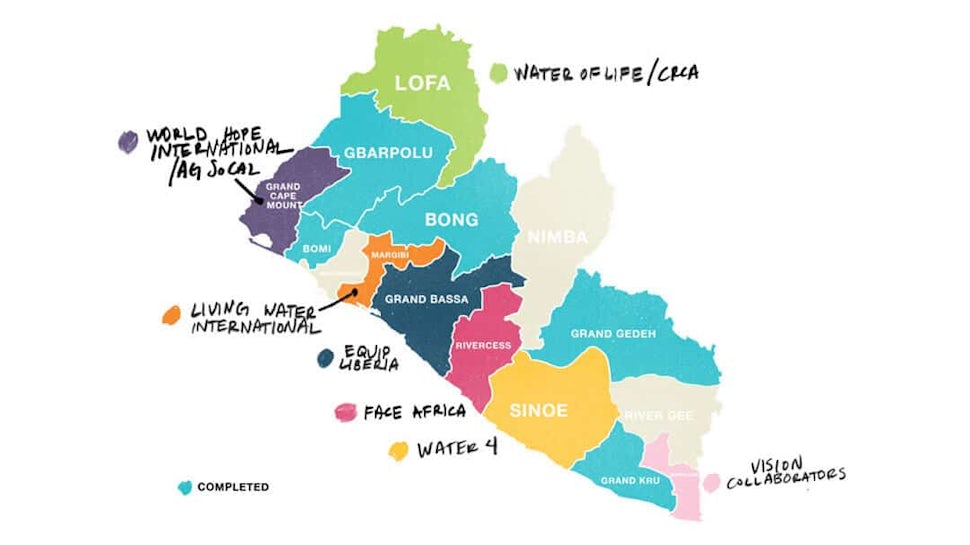These water filtration systems are saving lives in Liberia
How Sawyer is making clean drinking water available to the most isolated communities in the country.

By Maya Harrison
How this company's water filters are saving lives in the most isolated communities in Liberia.
Liberia is one of the most biodiverse hotspots globally, with a lush ecosystem comprising over 2000 plant species, hundreds of endangered animals, and a rising population of approximately 5 million people. The Upper Guinea Rainforest, primarily in Liberia, holds status with the Congo, Amazon, and Indonesian rainforests as the world's most critical tropical ecosystems.
The challenges of isolation and the repercussions of war.
Liberia is largely isolated within this lush biodiversity, and there's an extreme difficulty in creating networks for clean drinking water. After two devastating civil wars from 1989 – 1996 and the second war period from 1999 – 2003, the infrastructure to provide clean water and sanitation for its people became almost nonexistent.
The data.
To this day, in Liberia, around three in ten people (1.3 million civilians) do not have access to clean drinking water, and almost 700 children under the age of five years old die each year from diarrhea (UNICEF Liberia).
Because 80% of Liberia's individuals do not have access to sanitary toilets, they must use the restroom outside. This quickly spreads illness and contaminates groundwater resources, many of which are already polluted from increased industrialization and toxic waste residue from mining.
When the Ebola outbreak struck Liberia in 2013, lack of clean water, toilets, and proper sanitation led to the rapid spread of Ebola nationwide. Access to clean water is essential for disease control, land restoration, life expectancy, and the indicator for any nation's success or peril.
The water filtration system that's changing the tides of water accessibility in Liberia.
With the assistance of Sawyer Products, Liberia is projected to be the first developing country with clean water, border to border, in every household by December 2020.
Here's how.
- The company has designed a water filtration system with an efficient and straightforward design that allows individuals easy access to water without spending time, money, and resources boiling out bacteria in contaminated water.
- Implementation of the filtration system bridges the gap between Liberia's isolated nature and inaccessibility to clean and drinkable water, bringing clean water to the last 20% of communities deemed too distant to reach.
- Sawyer reduced diarrhea among the Liberian population by 90%, helping maintain clean waterways and groundwater resources.
- According to Sawyer, "In the first 23,719 households analyzed, 34% reported cases of diarrhea. After a two-week follow-up, the number was down to 2.95%. A second follow up at eight weeks reported another decrease. The use of Sawyer was able to reduce diarrhea by over 90%."
- Sawyer systems zero out the need for wood to boil water for drinking. This over-extraction of trees results in wood scarcity, environmental strain, and an increased probability of mudslides in many areas. Sawyer claims that "With an average family size of 6 people, a single Sawyer Filter can save 239-478 trees per year! With all of the filters we have around the world right now, we could have saved over 475,000,000 trees!"
- Research teams from Calvin College are collecting and analyzing data from GIS (geographic information system) software to track the implementation of 100,000 Sawyer Filters across Liberia. The results on the impact of implementing Sawyer filters and their compound effect will be submitted for scientific publication in the American Journal of Tropical Medicine and Hygiene.
Sawyer International partners with the UN Millennium Development Goal and is on a mission to bring clean, safe drinking water to nations worldwide, including Liberia, Fiji, Haiti, Belize, and Thailand. To learn more, join, and support Sawyer Internationals mission check out their website here and social media platforms such as Instagram, Twitter, and Youtube.
We want to acknowledge and thank the past, present, and future generations of all Native Nations and Indigenous Peoples whose ancestral lands we travel, explore, and play on. Always practice Leave No Trace ethics on your adventures and follow local regulations. Please explore responsibly!
Do you love the outdoors?
Yep, us too. That's why we send you the best local adventures, stories, and expert advice, right to your inbox.








